It was the political theory of anarchism that encouraged Philip O’Sullivan to study the environment and geography. Anarchism asks fundamental questions such as: how should society be organised? Why should we obey authority and the state? How can individual freedoms and community needs be reconciled? What links humans and nature? Some fascinating answers linking geography with anarchism come from the writings of a Russian anarchist prince called Peter Kropotkin.
In the following podcast you can listen to the Philip being interviewed by Andy Morris, which introduces you to Kropotkin's life and ideas. Philip is interviewed by Andy Morris from The Open University’s Geography Department.
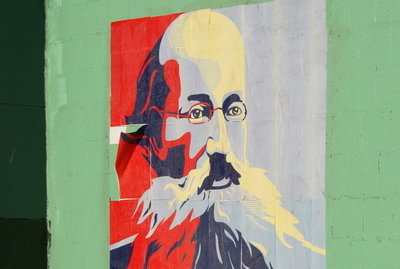
Transcript
Andy Morris (AM): Hello, I'm Andy Morris and I'm joined today by my colleague from the Geography Department at The Open University, Philip O’Sullivan, to find out a little about the fascinating work and extraordinary life story of Peter Kropotkin, a Russian geographer who died almost a hundred years ago but who still provides us with some interesting insights today.
So, Philip, who was Peter Kropotkin?
Philip O’Sullivan: Hi Andy, Peter Kropotkin was born into the aristocracy of Tsar Sasha in Moscow in the early 1840s. He was an explorer, a scientist and a geographer. He was a revolutionary who at one time made a daring escape from prison in Russia. He was later imprisoned again in France. He moved to western Europe in the 1870s. He became the leading figurehead and theorist of the international anarchist movement from around about the 1880s until his death in Russia in 1917. He was educated at an elite military school, his father being of sort of noble birth. He became an army officer. He led several important geographical and geological expeditions in eastern Siberia and Manchuria but he became disillusioned with that. He resigned his commission in 1867. He continued his sort of fieldwork, researching and publishing geographical works. He did those for the Russian Geographical Society until 1871.
AM: Before we go on, Philip, I have to just take you back to this daring prison escape. Can you just tell us a bit more about that?
PO’S: Yes, he was imprisoned in Saint Petersburg in a military sort of hospital wing. And by sort of secret messages, things hidden in watch cases, and sort of dressing up as somebody else in disguise he managed a sort of roof top escape into a waiting carriage where they sped through the streets of Saint Petersburg. And in fact that night he dined with friends and family in the most expensive restaurant in Saint Petersburg because he thought it was the last place the police would look for him. He led a very very interesting life.
AM: He certainly did by the sounds of it. So, I mean, there are so many things here going on but just really to bring it back to this seemingly sharp distinction as well between Kropotkin, the army officer, and Kropotkin, the revolutionary. How does he kind of go from being one to the other?
PO’S: Good question. It comes from sort of a life changing decision he was faced with. He was away on a geographical expedition of Finland in 1871. He received this telegram offering him the post of the Secretary of the Russian Geographical Society, so it sort of struck him then he had this choice. He was either going to become sort of an establishment-type, scientific figure of the establishment, pursue his scientific career. But also, when he had been in Siberia in his youth as an army officer, he was struck by the poverty of the people there. And then when he was in Finland he was struck by the poverty of the Finnish peasants too. And he was increasingly being influenced by socialist ideas from western Europe. So he decided he had this choice: was he going to be an establishment scientific-figure or was he going to devote his life to becoming a revolutionary and helping the people? And he chose the latter.
AM: Okay. So I guess this then really heralds the beginning of that extraordinary phase in Kropotkin’s life, doesn’t it?
PO’S: It does. So he went back to Saint Petersburg and he joined the underground revolutionary movement there and that’s when he’s imprisoned in 1874 for these sort of underground activities. He escaped, as I mentioned, a couple of years later in 1876. He made his way to England, which was a safe refuge place at the time. A year later he moved to Switzerland. He then had to move on to France because he was seen as a sort of undesirable political activist. He was arrested in France for political reasons essentially and sentenced to five years in prison there. It was a very strange time actually because he still in a sense did pursue this sort of double life, Andy, because while he was in prison he was receiving support from the Royal Geographical Society in London – some of the most notable sort of academics and scientists of the day who were helping him: supplying him with materials and maps and books and articles he needed to continue his sort of geographical and scientific studies, while at the same time he was sort of writing revolutionary and anarchist pamphlets as well. So he was in with sort of support actually in lobbying from some of these sort of scientific establishment figures in London. He was released from prison in France in 1886 and he moved back to England where he settled and he lived there until 1917.
AM: So in England he sounds like he manages to settle and combine his political activism and his geographical and other academic writing.
PO’S: That’s right. He sort of lived, in a sense, a double life but he was accepted across all parts of society really. He earned his living, if you like, he earned his keep, by writing geographical articles for the journal, Nature. And he wrote regular, small scientific columns for the Times newspaper, but at the same time he was writing these sort of anarchist pamphlets and essays, which were then sort of collected into books. I suppose the three most famous books he wrote around this time, the first would be The Conquest of Bread. It was published in 1892. It really is a sort of fuller statement of his anarchist communism and sort of the perfect anarchist society he envisaged. Factories, Fields and Workshops is another book, which should be of interest to anybody interested in the environment in geography. It was published in 1899. Again, a collection of essays but what he did there was he sort of discussed the integration of urban rural economies. You know there should be – fields and factories – should be somehow together and not – not separate. And then 1902 was the date he published Mutual Aid, which is probably his most famous work. He was a Darwinist but he argued against social Darwinism the sort of you know competitive nature of race of the fittest. He believed that it wasn’t actually competition but it was actually cooperation between species, which he’d observed as sort of a scientist, and a naturalist, which was the guiding factor in evolution. So he tried to project those sort of scientific views of cooperation in nature on to the way he thought society should be ordered. He only returned to Russia after the Bolshevik Revolution in 1917 where, having encountered the poverty and conditions there, he actually engaged and pleaded unsuccessfully with Lenin, both by letter and actually in person, to act on the failings of the new regime and the fact that it hadn't improved the working conditions for the poor people.
AM: And I guess by the time of the Revolution he would have been getting towards the end of his life wouldn't he?
PO’S: That’s right. He died in February 1921, forty miles from Moscow. He lived on a farm with his wife. He wasn’t really involved politically and his funeral was attended by twenty thousand people so he was still a much loved figure.
AM: Okay. So why have you chosen to highlight Kropotkin’s work to OU students interested in geography and what do you think it still offers us today?
PO’S: The way geographers think about a range of related issues today from ethnicity and race to social inequality to issues of urban regional planning, to issues about the environment and how we produce and consume food, all of those are seen in Kropotkin’s writings and he was also very influential in the emergence of radical geography in the late 1960s and ‘70s. So I would argue his ideas, the ideas he developed over a hundred years ago are still a centre of concern to contemporary geographical theory and thinking on the environment as well. You may not find any direct references to him or some of his writings in our OU modules but his interest and ideas are contained in so many of our modules. In DD102, for example, the strand on connecting and ordering lives. In DD103 the theme of inequality as well as many other issues are explored in our Level Two and Three Geography in Environment modules. All contain essential key ideas, which Kropotkin wrote about a hundred years ago and which are still relevant and contested today.
AM: Great. Well, thanks very much Philip for joining me today.
Further reading
If you want to find about more about Kropotkin's life and ideas, and how they connect to specific Open University modules, read
Kropotkin – The Geographer, Anarchist and Russian Prince
(102.2 KB)
, which also includes a list of books and websites on Kropotkin and anarchism.
Read more articles from Geography Matters
-
Weather derivatives - the financialization of weather
Listen now to access more details of Weather derivatives - the financialization of weatherIs it possible to manage the risks presented by nature, such as too much rain at the wrong time of the year and very harsh frosts?

-
The European Union and the impact on mixed nationality relationships in northern Finland
Listen now to access more details of The European Union and the impact on mixed nationality relationships in northern FinlandCarol Brown-Leonardi investigates how Britain’s exit from the European Union has affected the perceptions and decision-making of mixed nationality couples to stay and live permanently in Finland or the United Kingdom.

-
Investigating environmental futures through speculative design
Read now to access more details of Investigating environmental futures through speculative designHow can ‘thinking through making’ facilitate new kinds of geographical enquiry?

-
Climate Change, Coastal Erosion and Flooding: The Thames Gateway and London
Read now to access more details of Climate Change, Coastal Erosion and Flooding: The Thames Gateway and LondonClimate change will lead to sea level rises and this will lead to enhanced coastal erosion. Professor David Humphreys explores the challenges that this will pose for the Thames Gateway in south-east England.

-
Convoy to Calais
Watch now to access more details of Convoy to CalaisHow should we respond to humanitarian crises in other countries? Steve Pile explores the geographies that underlay the 2016 “Convoy to Calais” protest.

-
Sounds of environmental change
Listen now to access more details of Sounds of environmental changeWhat does environmental change sound like? Dr George Revill argues that sound can be a powerful way of conveying how places are transformed by climate change.

-
The sharing economy
Take part now to access more details of The sharing economyHow sharing and caring is the sharing economy? Petr Jehlička takes a critical look at the booming sector and traces its hidden connections and contradictions.

-
From Brexit to the break-up of Britain?
Learn more to access more details of From Brexit to the break-up of Britain?This free course, From Brexit to the break-up of Britain?, sets the experience of Brexit in the context of the UK. It first analyses Brexit as a symptom of the political, economic and social geography of the UK, focusing on its uneven development in a country increasingly dominated by London and the South East of England. It then considers how ...

-
Climate change's causes, effects and geographies of responsibility
Read now to access more details of Climate change's causes, effects and geographies of responsibilityThe idea of climate change is increasingly well-known, but it can be hard to understand its effects in human terms. Professor David Humphreys describes how he experienced Climate Change first hand when working in Bangladesh for The Open University.

-
International health service: How the NHS has always relied on overseas labour
Read now to access more details of International health service: How the NHS has always relied on overseas labourPotential NHS staff from outside of European Economic Area (EEA) will shortly find it easier to secure permission to work in the UK. Yet doctors and nurses from the EEA may no longer have the right to do so. Dr Parvati Raghuram looks at how the NHS has depended on foreign workers since its creation.

-
Can we live harmoniously with wildlife?
Read now to access more details of Can we live harmoniously with wildlife?In light of a man-eating tiger being killed in The Nilgiris District, India, we need to address human-animal and human-human conflict in our forests.

-
The navigation apps that help the visually impaired
Read now to access more details of The navigation apps that help the visually impairedA technological revolution is underway improving the lives of many who may benefit from additional assistance says human geographer, Dr Oliver Zanetti.

-
How do you know you are in a smart city?
Watch now to access more details of How do you know you are in a smart city?Integrated urban technology is less apparent when it is functioning well says, Gillian Rose, Professor of Human Geography at the University of Oxford.

-
Studying Environments and Societies
Listen now to access more details of Studying Environments and SocietiesWhat does human geography have to do with studying the environment?
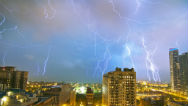
-
How data is making our cities smarter
Watch now to access more details of How data is making our cities smarterData research may lead to more efficient, sustainable and democratic societies says Gillian Rose, Professor of Human Geography at the University of Oxford.

-
Approaching the break up of Britain?
Read now to access more details of Approaching the break up of Britain?What does the geography of the referendum vote tell us about the (increasingly dis-) United Kingdom?

-
Five smart technologies helping the visually impaired
Watch now to access more details of Five smart technologies helping the visually impairedCutting-edge research is enabling the development of new potentially life-changing prototypes aimed at serving those with disabilities says, Dr Oliver Zanetti.

-
Can yoga help us achieve sustainable development goals?
Read now to access more details of Can yoga help us achieve sustainable development goals?Shonil Bhagwat explains the yogic way of understanding how individual actions relate to global challenges.

-
Gender, IT and economic growth
Read now to access more details of Gender, IT and economic growthDoes gender matter to the world's fastest growing economies? Parvati Raghuram explores how the labour driving many Rising Powers is gendered.

-
My Interest in Cities is Really an Interest in the Way People Live
Watch now to access more details of My Interest in Cities is Really an Interest in the Way People LiveHow do cities bring places, relationships and networks together, and what sorts of politics do they create?

-
Non-existent countries
Listen now to access more details of Non-existent countriesWhat makes a country count as a country? Andy Morris interviews geographer and broadcaster Nick Middleton about his recent book 'An Atlas of Countries that Don't Exist'.

-
United Nations Climate Change Conference - COP21
Take part now to access more details of United Nations Climate Change Conference - COP21This interactive map is a world first. It gives you the chance to explore a major international meeting on climate change as if you were there.

-
Earth In Vision: A Collection
Watch now to access more details of Earth In Vision: A CollectionThe Earth in Vision project explores the BBC archives of environment themed television and radio programmes from the last 70 years, looking at the potential of these archives as a digital resource as well as to illustrate the potential of digital broadcast archives for researchers.

-
Stories of Change - The Interviews
Listen now to access more details of Stories of Change - The Interviews'Stories of Change' interviews with Roger Harrabin.

-
Dropping the population bomb - 50 years of BBC environmental broadcasting, part two
Read now to access more details of Dropping the population bomb - 50 years of BBC environmental broadcasting, part twoHow have the films and radio programmes broadcast by the BBC shaped how we understand environmental change issues? Joe Smith shares his journey through the archives in the second part of a two part podcast series.

-
Fifty years of BBC broadcasting about environmental change issues
Listen now to access more details of Fifty years of BBC broadcasting about environmental change issuesHow have the films and radio programmes broadcast by the BBC shaped how we understand environmental change issues? Joe Smith shares his journey through the archives in a two part podcast series.

-
Syria, Spitsbergen and Seeds
Listen now to access more details of Syria, Spitsbergen and SeedsHow are the civil war in Syria, the remote Norwegian island of Spitsbergen, and the future of the world’s food supplies connected?
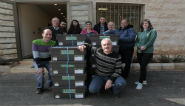
-
The Legacy of Nuclear Power, Part 2
Listen now to access more details of The Legacy of Nuclear Power, Part 2What ethical decisions does burying nuclear waste involve, and how are we responsible to future generations?
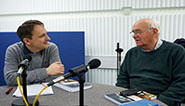
-
Another spoonful? Understanding the Place of Sugar - Part Two
Read now to access more details of Another spoonful? Understanding the Place of Sugar - Part TwoSteve Pile looks at the changing geographies of sugar.

-
One Lump or Two? Understanding the Place of Sugar - Part One
Read now to access more details of One Lump or Two? Understanding the Place of Sugar - Part OneSugar is a Contradiction - explore the cultural paradox of this ubiquitous ingredient, with Professor Steve Pile.

-
Protecting Landscapes and Creating the Right Tools for the Job
Listen now to access more details of Protecting Landscapes and Creating the Right Tools for the JobHow do national parks manage the demands of different users, whilst still conserving natural beauty?
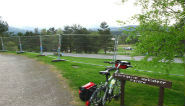
-
The Legacy of Nuclear Power: Part 1
Listen now to access more details of The Legacy of Nuclear Power: Part 1How do local communities respond to the risks and opportunities of nuclear power?

-
Researching cycling in the US & the UK
Listen now to access more details of Researching cycling in the US & the UKPeter Wood shares his experiences researching cyclists - on both sides of the Atlantic.

-
Why I believe 'yes' is only a matter of time
Listen now to access more details of Why I believe 'yes' is only a matter of timeDespite voters in 2014 choosing to stay in the United Kingdom, Gerry Mooney believes that in the long run, an Independent Scotland is inevitable. He explains why.

-
Family photos and what they mean
Watch now to access more details of Family photos and what they meanWhat can family photos tell us about households, gender roles and emerging technology? Professor Gillian Rose explores her research on family photography, and how this work interacts with her own experiences.

-
Coping on the Coast: moral economies and liminality at the heart of things that matter
Watch now to access more details of Coping on the Coast: moral economies and liminality at the heart of things that matterDoes geography influence peoples’ sense of security and well-being?

-
‘Citizen sensing’ and new forms of environmental monitoring
Read now to access more details of ‘Citizen sensing’ and new forms of environmental monitoringWhat technological challenges are faced by communities seeking to understand environmental change at different geographical scales?

-
Should we be worried about the US withdrawal from the Paris climate agreement?
Read now to access more details of Should we be worried about the US withdrawal from the Paris climate agreement?The UK government has confirmed that despite the path chosen by the US, the UK would honour the Paris Agreement. Here Shonil Bhagwat looks at the motivations and implications behind the US decision, and how international action on climate change will go on.

-
Should Economics and the Environment work together?
Listen now to access more details of Should Economics and the Environment work together?The recent UK general election saw many parties pledge to ‘improve’ the environment. Vicky Johnson considers progress can be measured by more closely connecting the environment to economics.

-
How is Milton Keynes a ‘smart’ city?
Watch now to access more details of How is Milton Keynes a ‘smart’ city?What is a ‘smart city’, and how is smart rooted into Milton Keynes’ past and future?

-
Milton Keynes and the roots of 'Smart' transport
Watch now to access more details of Milton Keynes and the roots of 'Smart' transportLearn about MK’s unique history of transport innovation, and how The Open University has been a part of the experiment.

-
Smart Cities in the Making: Learning from Milton Keynes
Watch now to access more details of Smart Cities in the Making: Learning from Milton KeynesWhy research Milton Keynes? Professor Gillian Rose introduces a study of how cities are increasingly using digital data to improve their management and create new ways of living.

-
Sir David Attenborough and The Open University
Watch now to access more details of Sir David Attenborough and The Open UniversitySir David Attenborough and The Open University have had a long-standing relationship since the university's birth. David explains how that relationship came about and how it has developed over the years.
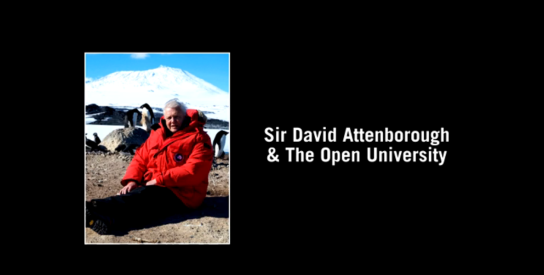
-
The Curious Geography of Weetabix: A Cereal Tale for Our Times
Read now to access more details of The Curious Geography of Weetabix: A Cereal Tale for Our TimesWhere is Weetabix actually from? Prof. John Allen investigates.

-
This is not a city: Milton Keynes
Read now to access more details of This is not a city: Milton KeynesWhat makes a city and why does it matter?

-
Europe’s Borders in Question
Read now to access more details of Europe’s Borders in QuestionStories about migrants, asylum seekers and refugees make media headlines almost every day. John Allen asks, what's the role of borders in this movement of people?

-
Introducing Geography Matters
Read now to access more details of Introducing Geography MattersThe 'Geography Matters' initative is coming to the Faculty of Arts and Social Sciences.

-
Brexit and the Irish border
Read now to access more details of Brexit and the Irish borderHow are Brexit and the Irish border connected? Dr Philp O'Sullivan reflects on the changing geographical relationship between the UK and Ireland.

-
Privatising Thames Water
Read now to access more details of Privatising Thames WaterHow did a public utlity turn into a financial instrument?

-
Seeing the internet
Read now to access more details of Seeing the internetHow do we see the internet? Gillian Rose explores why some artists and campaigners think it's important that the internet is made more visible.

-
Climate change: the kale smoothie of TV
Read now to access more details of Climate change: the kale smoothie of TVIs climate change the kale smoothie of TV schedules: unappealing but somehow fashionable and even essential to the diet?

-
The environmental costs of Trump’s wall
Read now to access more details of The environmental costs of Trump’s wallTrump's wall will not only have long-lasting impact on human society, but also severe ecological consequences.

-
Heathrow third runway: who and where will benefit?
Read now to access more details of Heathrow third runway: who and where will benefit?Exploring the costs and benefits of expanding Heathrow, using a geographical analysis.

-
Change in the West of Ireland
Read now to access more details of Change in the West of IrelandIntroducing a collection of articles asking 'How can unique and distinctive regions, like the West of Ireland, retain the qualities that make them unique while continuing to modernise and interact with the wider world?'

-
Scoring the Shoreline
Read now to access more details of Scoring the ShorelineGeorge Revill considers the synergy between sound waves and ocean waves - how the coast of Britain has inspired the nation's musical heritage.
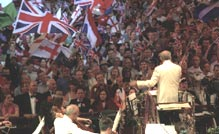
-
London inside out
Read now to access more details of London inside outFifteen years since the 7/7 bombings, we look back at unity in London after the terror attacks...

-
Methods in Motion: Getting on your bike, and looking for answers
Read now to access more details of Methods in Motion: Getting on your bike, and looking for answersDr Peter Wood, a Visiting Fellow with the Geography Discipline, argues that although methodological choices are often seen as technical decisions, they can actually be key to intellectual creativity.

-
Is public spending a drain on the economy or the mark of a civilised society?
Read now to access more details of Is public spending a drain on the economy or the mark of a civilised society?Read this article outlining arguements in debate held under the auspices of the Social Sciences Student Connections, Big Conversation.

Rate and Review
Rate this audio
Review this audio
Log into OpenLearn to leave reviews and join in the conversation.
Audio reviews